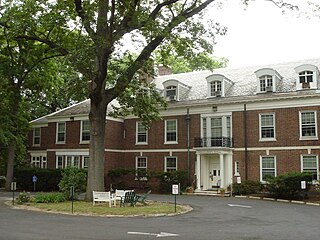Related Research Articles
The subject of homosexuality and Judaism dates back to the Torah. The book of Vayikra (Leviticus) is traditionally regarded as classifying sexual intercourse between males as a to'eivah that can be subject to capital punishment by the current Sanhedrin under halakha.

Reconstructionist Judaism is a Jewish movement based on the concepts developed by Rabbi Mordecai Kaplan (1881–1983) that views Judaism as a progressively evolving civilization rather than just a religion. The movement originated as a semi-organized stream within Conservative Judaism, developed between the late 1920s and the 1940s before seceding in 1955, and established a rabbinical college in 1967. Reconstructionist Judaism is recognized by many scholars as one of the five major streams of Judaism in America alongside Orthodox, Conservative, Reform, and Humanistic.

Women in Judaism have affected the course of Judaism over millenia. Their role is reflected in the Hebrew Bible, the Oral Law, by custom, and by cultural factors. Although the Hebrew Bible and rabbinic literature present various female role models, religious law treats women in specific ways. According to a 2017 study by the Pew Research Center, women account for 52% of the worldwide Jewish population.

A siddur is a Jewish prayer book containing a set order of daily prayers. The word siddur comes from the Hebrew root ס־ד־ר, meaning 'order.'

The Reconstructionist Rabbinical College (RRC) is a Jewish seminary in Wyncote, Pennsylvania. It is the only seminary affiliated with Reconstructionist Judaism. It is accredited by the Commission on Higher Education of the Middle States Association of Colleges and Schools. RRC has an enrollment of approximately 80 students in rabbinic and other graduate programs.
Jewish feminism is a movement that seeks to make the religious, legal, and social status of Jewish women equal to that of Jewish men in Judaism. Feminist movements, with varying approaches and successes, have opened up within all major branches of the Jewish religion.

Women of the Wall is a multi-denominational Jewish feminist organization based in Israel whose goal is to secure the rights of women to pray at the Western Wall, also called the Kotel, in a fashion that includes singing, reading aloud from the Torah and wearing religious garments. Pew Research Center has identified Israel as one of the countries that place "high" restrictions on religion, and there have been limits placed on non-Orthodox streams of Judaism. One of those restrictions is that the Rabbi of the Western Wall has enforced gender segregation and limitations on religious garb worn by women. When the "Women of the Wall" hold monthly prayer services for women on Rosh Hodesh, they observe gender segregation so that Orthodox members may fully participate. But their use of religious garb, singing and reading from a Torah have upset many members of the Orthodox Jewish community, sparking protests and arrests. In May 2013 a judge ruled that a 2003 Israeli Supreme Court ruling prohibiting women from carrying a Torah or wearing prayer shawls had been misinterpreted and that Women of the Wall prayer gatherings at the wall should not be deemed illegal.
Rabbi Rebecca Trachtenberg Alpert is Professor of Religion Emerita at Temple University, and was one of the first women rabbis. Her chief academic interests are religions and sports and sexuality in Judaism, and she says that her beliefs were transformed by a Sabbath prayer book that refers to God as 'She'.
Menachem Creditor is an American rabbi, author and musician. He is the Pearl and Ira Meyer Scholar-in-Residence at UJA-Federation New York and the founder of Rabbis Against Gun Violence. His work has appeared in the Times of Israel, the Huffington Post, the Jewish Week, the Jewish Daily Forward, the Wall Street Journal, and The New York Times.
The first openly lesbian, gay, bisexual, and transgender clergy in Judaism were ordained as rabbis and/or cantors in the second half of the 20th century.
Lesbian, gay, bisexual, transgender (LGBT) affirming denominations in Judaism are Jewish religious groups that welcome LGBTQ members and do not consider homosexuality to be a sin. They include both entire Jewish denominations, as well as individual synagogues. Some are composed mainly of non-LGBT members and also have specific programs to welcome LGBT people, while others are composed mainly of LGBT members.
Same-sex marriage in Judaism has been a subject of debate within Jewish denominations. The traditional view among Jews is to regard same-sex relationships as categorically forbidden by the Torah. This remains the current view of Orthodox Judaism.

Sharon Kleinbaum is an American rabbi who served as spiritual leader of New York City's Congregation Beit Simchat Torah for 32 years. She is now the synagogue's first Senior Rabbi Emerita. She has been an active campaigner for human rights and civil marriage for gay couples.
This is a timeline of women rabbis:

Ritualwell is a website that allows users to find, create and share Jewish rituals. It was initially launched in 2001 and was nominated for a Webby Award in the Religion & Spirituality category in 2003. The site was redesigned and relaunched in 2005. It seeks to "increase the number of rituals available for holidays, Shabbat and traditional lifecycle events.

Susan Silverman is an Israeli-American Reform rabbi and religious activist.
Or Haneshamah, officially, Or Haneshamah – Ottawa's Reconstructionist Community, is a Jewish Reconstructionist synagogue located in Ottawa, Ontario, Canada. The congregation is one of only three affiliated Reconstructionist congregations in Canada, and the only Reconstructionist congregation in Ottawa. Founded in 1987, Or Haneshamah describes itself as a progressive, liberal, egalitarian, inclusive, multi-generational congregation notable for welcoming all Jews, including unaffiliated, intermarried, and LGBTQ individuals and families. As of 2016, the congregation's membership constituted approximately 90–100 households.
This is a timeline of LGBT Jewish history, which consists of events at the intersection of Judaism and queer people.

A Mi Shebeirach is a Jewish prayer used to request a blessing from God. Dating to the 10th or 11th century CE, Mi Shebeirach prayers are used for a wide variety of purposes. Originally in Hebrew but sometimes recited in the vernacular, different versions at different times have been among the prayers most popular with congregants. In contemporary Judaism, a Mi Shebeirach serves as the main prayer of healing, particularly among liberal Jews, to whose rituals it has become central.
Elizabeth (Liz) Bolton is a rabbi, feminist, and activist. Hired in 2013 by Reconstructionist synagogue Or Haneshamah, she is Ottawa’s first female and openly gay rabbi. In the late 1980’s, she led efforts to address the exclusion of women from the cantorate in Canada.
References
- ↑ "Deborah Brin | Jewish Women's Archive". Jwa.org. Retrieved 2017-01-29.
- 1 2 3 "Rabbi". nahalatshalom.org. Archived from the original on 2016-03-04. Retrieved 2012-03-04.
- ↑ Judy B. "Women of the Wall founding Rabbi Deborah Brin - Nahalat Shalom". Archived from the original on 18 December 2014. Retrieved 17 December 2014.
- ↑ Szymkowicz, Sarah. "Women Of The Wall". Jewish Virtual Library.
- ↑ "The Women Rabbis Of New Mexico". The Jewish Daily Forward. 15 July 2014.
- ↑ "PinkNews' top 10 Jewish gay and lesbian icons". PinkNews.co.uk. 24 September 2014. Retrieved 17 December 2014.
